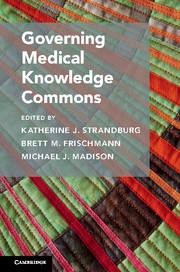Governing Medical Knowledge Commons
Governing Medical Knowledge Commons makes three claims: first, evidence matters to innovation policymaking; second, evidence shows that self-governing knowledge commons support effective innovation without prioritizing traditional intellectual property rights; and third, knowledge commons can succeed in the critical fields of medicine and health. The editors’ knowledge commons framework adapts Elinor Ostrom’s groundbreaking research on natural resource commons to the distinctive attributes of knowledge and information, providing a systematic means for accumulating evidence about how knowledge commons succeed. The editors’ previous volume, Governing Knowledge Commons, demonstrated the framework’s power through case studies in a diverse range of areas. Governing Medical Knowledge Commons provides 15 new case studies of knowledge commons in which researchers, medical professionals, and patients generate, improve, and share innovations, offering readers a practical introduction to the knowledge commons framework and a synthesis of conclusions and lessons. The book is available Open Access at http://dx.doi.org/10.1017/9781316544587.
Katherine J. Strandburg is the Alfred B. Engelberg Professor of Law at New York University School of Law, where she specializes in patent law, innovation policy, and information privacy law. Her research considers the implications of collaboration, social interactions, and technological change for law and policy in these areas, often from an interdisciplinary perspective. Professor Strandburg is an experienced litigator and has authored several amicus briefs to the Supreme Court and federal appellate courts dealing with patent and privacy law. Prior to her legal career, she was a physicist studying statistical mechanics and phase transitions at Argonne National Laboratory, having received her PhD from Cornell University and conducted postdoctoral research at Carnegie Mellon University.
Brett M. Frischmann is the Charles Widger Endowed University Professor in Law, Business and Economics at Villanova University Charles Widger School of Law, where he teaches Internet law, intellectual property law, and related technology law courses. Frischmann holds an undergraduate degree in astrophysics and graduate degrees in engineering and law. His book Infrastructure: The Social Value of Shared Resources (2012) received the 2012 PROSE award and was reviewed in the Economist and Science. Frischmann is also coauthor of Cyberlaw: Problems of Policy and Jurisprudence in the Information Age, a leading textbook on Internet law.
Michael J. Madison is Professor of Law and Faculty Director of the Innovation Practice Institute at the University of Pittsburgh School of Law. His research and scholarship address intellectual property law and policy, as well as questions concerning the production and distribution of knowledge and innovation. He is the author of more than 40 journal articles and book chapters and the coauthor of The Law of Intellectual Property (5th ed., 2017). He was elected to membership in the American Law Institute in 2016. He received his law degree from Stanford University and his undergraduate degree from Yale University.

